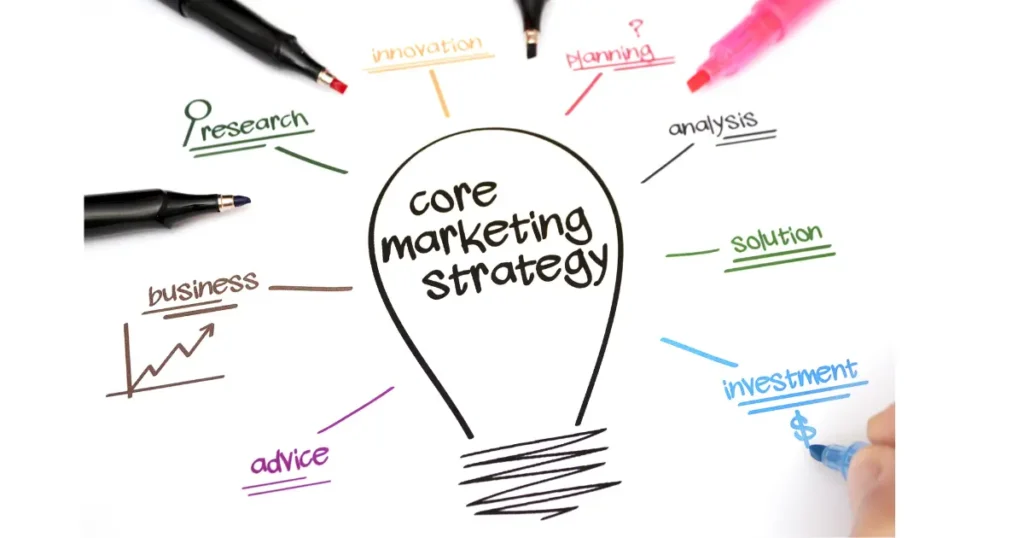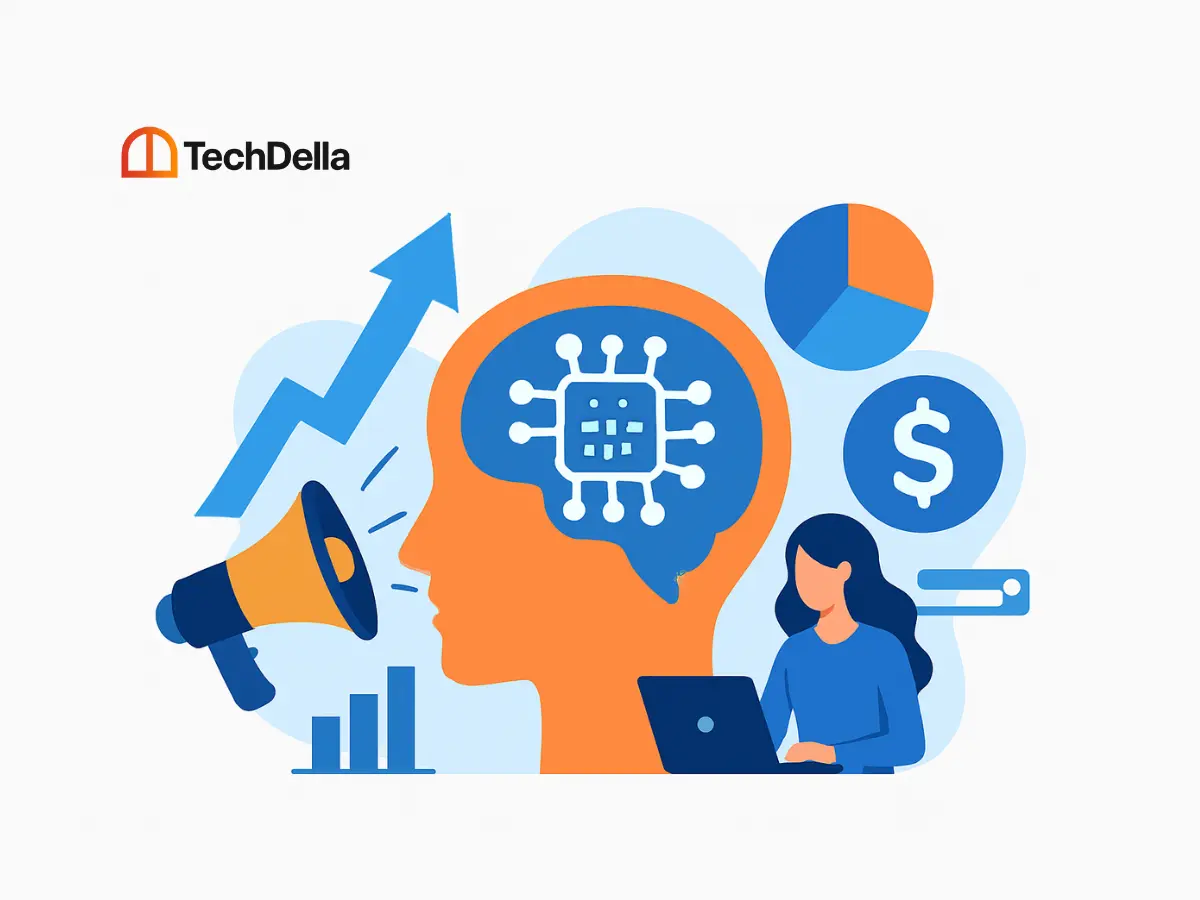If you’re running a business in 2026 and still approaching marketing the way you did three years ago, you’re already behind. The Impact of AI on Marketing isn’t just about fancy tools or futuristic tech, it’s about fundamentally changing how businesses connect with customers, make decisions, and grow revenue. And the best part is that you don’t need a Fortune 500 budget to get started.
Let’s talk about what’s really happening in the world of AI-powered marketing, why it matters to your business, and how you can actually use it without losing the human touch that makes your brand unique.

Why the Impact of AI on Marketing Can’t Be Ignored Anymore
The numbers don’t lie. The AI marketing industry has reached $47.32 billion in 2025 and is projected to exceed $107 billion by 2028. But here’s what’s more telling: 60% of marketers now use AI marketing tools daily, up from just 37% in 2024. This isn’t a trend, it’s a fundamental shift in how marketing works.
The Impact of AI on Marketing goes beyond automation. We’re talking about technologies that can predict customer behavior before it happens, personalize content for thousands of people simultaneously, and optimize campaigns in real-time while you sleep. Traditional marketing relied on educated guesses and historical data. AI in digital marketing uses machine learning algorithms and predictive analytics to show you what’s coming next.
Think about it: your competitors are using AI to understand your shared customers better, create more engaging content faster, and make data-driven decisions instantly. The question isn’t whether you should adopt artificial intelligence in marketing, it’s how quickly you can start.
How AI Is Transforming Core Marketing Functions
It’s important to understand that the Impact of AI on Marketing touches virtually every aspect of how businesses communicate with their audiences. From the moment a potential customer first hears about your brand to the post-purchase experience, AI is creating opportunities for smarter, more effective engagement.

Personalization That Actually Feels Personal
Remember when “personalization” meant putting someone’s first name in an email? Those days are over. The real Impact of AI on Marketing shows up in hyper-personalization, delivering the right message to the right person, through the right channel, at exactly the right time.
Companies like Nike have increased their e-commerce conversion rates by 35% using AI systems that analyze customer behavior across mobile apps, websites, and physical store visits. The technology doesn’t just track what people buy, it understands browsing patterns, abandoned carts, preferred communication times, and even predicts what customers might want before they know it themselves.
Here’s where it gets practical for your business. AI marketing automation tools can now segment your audience based on hundreds of behavioral signals, not just basic demographics. Someone who visits your pricing page three times in a week needs a different message than someone casually browsing your blog. AI-powered content creation ensures each segment gets relevant, engaging content without you manually writing dozens of variations.
At Techdella, we’ve helped startups and scaling businesses implement these AI-driven marketing strategies through our full-stack approach. Whether you need marketing automation setup, AI content marketing workflows, or complete campaign optimization, we build systems that turn personalization from a buzzword into revenue. Our clients have seen qualified leads increase by 150% after implementing AI-enhanced segmentation and targeting.
Content Creation That Scales Without Sacrificing Quality
Let’s address the elephant in the room: yes, AI can write content. But the Impact of AI on Marketing for content creation isn’t about replacing human creativity; it’s about augmenting it. The smartest marketers use generative AI tools to handle the heavy lifting while they focus on strategy and refinement.
AI content generation excels at producing first drafts, repurposing existing content across multiple channels, creating variations for A/B testing, and generating meta descriptions and social media posts. What it can’t do, at least not yet, is understand your brand’s unique voice the way your team does, or craft genuinely original ideas that break through the noise.
The data backs this up: 93% of marketers say AI helps them create content faster, while 81% report increased brand awareness and sales from AI-generated content. But here’s the catch, the most successful implementations combine AI marketing tools with human oversight.
This is exactly the approach Techdella takes with our content marketing services. We use AI to scale production of SEO-optimized blogs, social media content, and email campaigns, but every piece goes through our strategists to ensure it aligns with your brand voice and business goals.
Our CMO-as-a-Service model means you get both the efficiency of AI and the strategic thinking that only experienced marketers can provide. We’ve helped clients produce 4x more content without expanding their team, and seen organic traffic grow by 200% as a result.
Predictive Analytics: Marketing With a Crystal Ball
Imagine knowing which leads are most likely to convert before you spend a dollar on them. Or understanding which customers are at risk of churning before they ghost you. That’s the power of predictive analytics in marketing, one of the most tangible examples of the Impact of AI on Marketing on bottom-line results.

AI algorithms analyze historical data, customer interactions, purchase patterns, and even external factors like seasonality to forecast future behavior. This means you can allocate your marketing budget to the highest-value opportunities, create retention campaigns before customers leave, and identify upsell opportunities at exactly the right moment.
Marketing AI platforms like those integrated into modern CRMs use natural language processing and machine learning to continuously refine these predictions. The more data they process, the smarter they become. For startups and growing businesses, this levels the playing field, you get enterprise-level insights without needing a massive team of data scientists.
Real-Time Campaign Optimization That Never Sleeps
Traditional marketing campaigns required constant manual monitoring and adjustment. You’d launch an ad, check the results a week later, make changes, and repeat. The Impact of AI on Marketing has made this process obsolete.
AI-powered advertising platforms now optimize campaigns in real-time, adjusting bids, targeting, creative elements, and placement automatically based on performance data. While you’re sleeping, AI is testing dozens of variations, shifting budget to winning combinations, and pausing underperforming elements. This level of marketing automation means your campaigns are always performing at their peak.
The major advertising platforms, Google Ads, Meta Ads, and LinkedIn, all have built-in AI optimization features. But knowing how to set them up correctly and interpret the results requires expertise. That’s where a partner like Techdella becomes invaluable. Our team manages AI-driven advertising campaigns from strategy through execution, ensuring your ad spend generates maximum ROI through data-driven marketing decisions.
The Challenges and Realities of AI Marketing Implementation
Let’s be honest: the Impact of AI on Marketing isn’t all sunshine and hockey-stick growth charts. There are real challenges businesses face when implementing these technologies, and understanding them upfront saves time, money, and frustration.

1. The Learning Curve Is Real
47% of organizations report negative consequences from using generative AI, often because they rushed implementation without proper training or strategy. AI marketing tools are powerful, but they’re not plug-and-play solutions.
Your team needs to understand prompt engineering for AI content tools, data interpretation for predictive analytics, and strategic oversight to ensure AI outputs align with brand guidelines.
This is why many successful businesses opt for partnerships rather than DIY approaches. Techdella’s team has already climbed that learning curve. We stay current with the latest AI marketing trends, test new tools continuously, and know which ones actually deliver results versus which ones are just hype. When you work with us, you skip the trial-and-error phase and jump straight to AI marketing strategies that work.
2. The Cost-Benefit Calculation
AI marketing software ranges from free tools to enterprise platforms costing thousands monthly. For startups and small businesses, figuring out which tools justify their cost can be paralyzing. The truth is, you don’t need every shiny new AI tool, you need the right ones for your specific situation.
The key is starting with high-impact, low-cost implementations. Free or affordable AI writing tools for content drafts, AI chatbots for customer service, and the built-in AI features in platforms you already use can deliver significant value before you invest in specialized software.
3. Ethical Considerations and Brand Trust
Here’s something 47% of businesses learned the hard way: AI-generated content can contain biases, inaccuracies, or tone-deaf messaging if not properly reviewed. As more consumers become aware of AI usage, maintaining trust requires transparency and quality control.
The most successful approach balances efficiency with ethics. Use AI to scale, but maintain human oversight. Be transparent when AI powers customer interactions. Prioritize data privacy and give customers control over how their information is used. These aren’t just nice-to-haves; they’re essential for long-term brand building in the AI marketing era.
Practical Steps to Leverage AI in Your Marketing
Ready to harness the Impact of AI on Marketing for your business? Here’s a realistic roadmap that works whether you’re a solo founder or leading a growing team.

- Start With Low-Hanging Fruit: Begin with AI tools that solve immediate pain points. If content creation takes too much time, try AI writing assistants like ChatGPT or Jasper. If email segmentation is manual and tedious, explore AI email marketing platforms. These quick wins build momentum and demonstrate ROI to stakeholders.
- Invest in Your First-Party Data: AI is only as good as the data it works with. Focus on collecting and organizing customer information through your CRM, website analytics, and customer interactions. Clean, structured first-party data is the foundation for effective AI personalization and predictive analytics.
- Test Before Scaling: The Impact of AI on Marketing isn’t one-size-fits-all. What works for a SaaS company might not work for e-commerce. Run small tests, measure results rigorously, and scale what performs. This experimental approach minimizes risk while maximizing learning.
- Partner With Experts: Here’s the reality, Most businesses don’t have time to become AI marketing experts while also running their company. That’s exactly why Techdella exists. We handle the complexity of AI implementation so you can focus on your product and customers. From SEO optimization using AI-powered tools to full-stack marketing automation, we bring expertise that would cost significantly more to build in-house.
Our GrowthSprint Pro and CMO-as-a-Service packages include AI integration as part of comprehensive digital marketing strategies designed for growth-stage companies.
Frequently Asked Questions
Will AI replace human marketers?
No, AI augments rather than replaces marketers. The Impact of AI on Marketing shifts roles from repetitive tasks to strategic thinking. 75% of marketing work is moving toward strategy, creativity, and ethical oversight. AI handles data analysis and execution while humans provide context, creativity, and brand judgment that machines can’t replicate.
How much does it cost to implement AI marketing tools?
Costs vary dramatically based on your needs. Free AI tools like ChatGPT can improve content creation immediately. Mid-range AI marketing platforms cost $100-500 monthly. Enterprise AI marketing software runs thousands monthly. The key is matching tools to business goals, not buying everything available. Working with an agency like Techdella often delivers better ROI than purchasing multiple tools you don’t fully utilize.
Is AI marketing only for large companies?
Absolutely not. The Impact of AI on Marketing actually levels the playing field. Startups can access AI-powered insights and automation that were previously available only to enterprises with massive budgets. AI democratizes sophisticated marketing capabilities, making them accessible through affordable tools and expert partners like Techdella, who specialize in startup growth.
Conclusion
AI is reshaping marketing in powerful ways, helping businesses grow faster, spend smarter, and engage customers with greater precision. Even though the landscape of tools can feel overwhelming, adopting the right approach does not need to be difficult.
Techdella helps startups and growing brands implement practical AI systems that drive real results, from SEO content and automated workflows to CMO-as-a-Service support. Instead of just adopting technology, our clients gain a true competitive edge. If you want to stop missing opportunities, book a discovery call with Techdella and build a marketing system that actually moves your business forward.
My name is Omolola, I am a dedicated Content Writer at Techdella. I excel in simplifying complex procedures and keeping audiences informed with the latest trends. With a passion for staying updated in the fast-paced digital world, I spend considerable time online to ensure my content remains relevant and engaging.
Get it in your inbox
One email a week. Real startup marketing insights — no filler.
Join 1,400+ founders. Unsubscribe anytime.
You're in!
Thanks for subscribing. Your first issue will arrive shortly.



